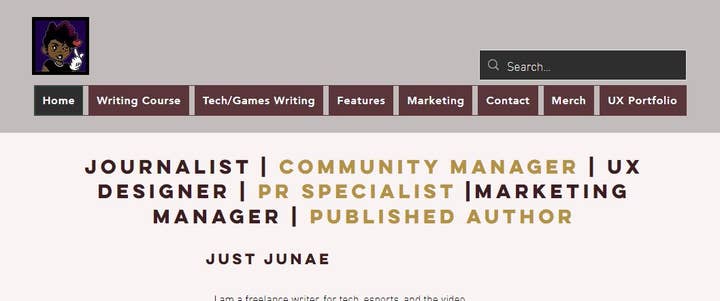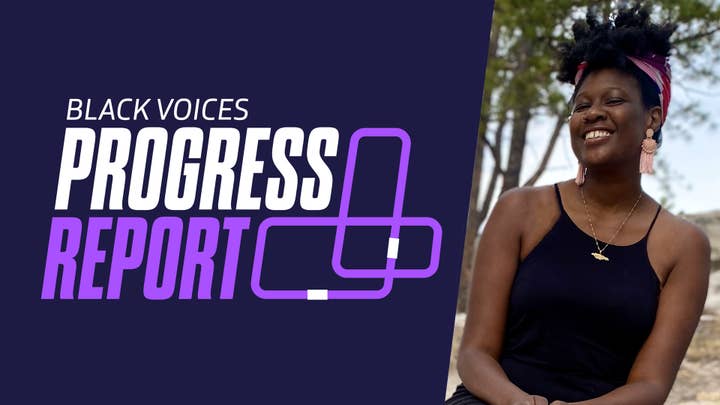The struggle with trying to utilise multiple skill sets | Black Voices Progress Report
Junae Benne has been working in the gaming industry for a decade, but says the rigid idea of what a game industry professional looks like makes it difficult to fit in
Sign up for the GI Daily here to get the biggest news straight to your inbox
This interview is part of GamesIndustry.biz's Black Voices Progress Report, offering insight into the different experiences Black professionals have in the games sector. You can read more about the project and check out the other entries on this page.
"I would love to feel like I'm a part of the gaming industry, but it's starting to feel as if you have to be on a list somewhere, as if it's a matter of where you live and who you know."
Junae Benne is a freelancer in games, struggling with a typical freelance problem – many freelancers have different skills, and often need to use different ones to earn money, which often makes it difficult to brand yourself. The gaming industry places a lot of value on deep expertise in a field, which can feel as if you have to pick a specialisation and stick with it – something Benne just doesn't want to do.
Following a degree in Media Communications and Broadcast Journalism from Northern Illinois University, Benne served as a contract community manager for studio SynapticSwitch, now SynaptixGames, before producing a weekly gaming news format for an online publication out of Colorado.
"I moved to Colorado and I was working for a video game marketing company. They used to put on conventions and they had like this little YouTube channel that I used to write for, even though I would have liked to do on-camera work, given my broadcast journalism experience," Benne says.
"People can't grasp that I am 15 different things because I just became what people needed me to be"
"I was learning about marketing, learning about community, learning about putting on events, while writing and interviewing people, where my background is and what I'm great at."
A fighting game enthusiast, Benne would eventually combine all of these skills to open her own gaming lounge strictly for fighting games.
"I learned how to build a community because fighting game players don't trust you. They do not trust you, and they want events tailor-made for their needs, they are very particular. I definitely learned from the toughest community there is," she says.
Benne put on regular tournaments and events in Chicago, while also running an after-school program for children.
"This is one of the things I'm most proud of," she says. "The city paid me and I could take all the kids that I wanted into my program, for free. They learned how to code, to like make video games, and I was teaching them how to think critically, how to not get bullied online, how to not fall into traps online, important internet literacy, basically."
This led to Benne being recruited by Xbox as a community development specialist, which entailed putting on events, social media, partnering with local Chicago institutions, and even teaching coding at summer camps.
While the skills required to do this job are related to Benne's background, a lot of it is hands-on knowledge, developed by taking on tasks related to her interests, something she feels can be hard for people to understand.
"When people told me to figure stuff out, I would take that literally. Someone needed an event, or someone needed to figure out how to reach people, and there isn't also a specific person for that around, so I would just do a multitude of things," Benne says.

Another example is her time at Black Girl Gamers, a Black-led community that also produces content by and about people of colour. Here, too, Benne did a bit of everything, from panel organisation to content creation, events and partner outreach.
"People can't grasp that I am 15 different things because I just became what people needed me to be, whenever," Benne says.
"I have the skills and experience of a marketing manager, but also a journalist and content creator, and sometimes it feels like I should rather have six different resumes than combine all of this, but none of my jobs can be that neatly categorised."
When Benne tried to translate her experience into full-time marketing positions, she was told she didn't have enough experience.
"I once applied to a company and was told by the recruiter that I had a lot of chicken and egg experience," Benne says, "Suggesting my skills weren't deep enough. Well, what else do I have to do?"
"I have the skills of a marketing manager, a journalist, content creator, and sometimes it feels like I should have six different resumes, but none of my jobs can be that neatly categorised"
Since it can be difficult to find out what to do, Benne did try to gain an industry mentor, without success, noting that in games-adjacent roles there is a lot less mentorship available than in game creation, and that in the current climate, many people in positions such as community management and marketing can be the first to go.
"I just don't have one single goal," Benne says. "I love people who have longevity, but I want to do a job that I love to do no matter where it is. And I think that's also the problem. It almost feels like I should have my own company that offers many different things because I want to throw events. I love throwing events, I love being a part of the community. I love to put on events and help people with ideas and do community stuff with kids, and I just haven't found a job that can do all three of those things and obviously create content."
Whenever Benne tried to focus on just one of her skillsets, she says it felt like entering the industry all over again.
"I was trying to make myself into a person who media trains people, and I tried to get into UX, but UX is very difficult to get into," Benne says.
"And it's difficult to know you have been part of the gaming industry for ten years and yet not feel part of it."
Being part of a minority in the industry, even just being a freelancer, can emphasise these feelings of otherness, and Benne is caught between wanting to help make the industry more accessible to people of colour, while also feeling it's not up to her to facilitate these changes.
"I think it's difficult to be a Black game professional in 2024 because everyone thinks that diversity was just a one-time push. I want to fight the good fight and help move the industry forward, but I feel like I can't get the support that I need because other professionals' hands are also tied," she says.
"I love my job, I love writing, and live and breathe content creation, so I don't get tired of that. But it's tiring to constantly have to look for ways to get to do what you want to do. You can't come into someone else's establishment and say 'Right, I'm going to change that.'"
"I always say that you should leave the gaming industry better than how you found it, and that's my goal"
Additionally, with many people in the industry leaving X (formerly Twitter) behind, to Benne, the industry feels more fragmented than before.
"I feel like shouting into the void again. Before, it was easier to lift up my colleagues or find support for my projects, but I left because I didn't see the point in using it anymore. Now I feel even more as if I've lost access to a community."
But in this matter, too, Benne has taken matters into her own hands, and created her own community.
"I have a newsletter about gaming and technology and I can include content creation, reviews, interviews, anything, and I use Discord. I respond to comments and post my newsletter in Discord and other people's Discords. So I get to talk to people that way.
Even though Benne, like many other people in the gaming industry, is currently not sure what her future holds, she still holds a deep love for gaming and all of its communities.
"I always say that you should leave the gaming industry better than how you found it, and that's my goal. Will I ever start a studio and hire all the BIPOC people ever and have the best AAA and indie games? No," she says. "But I work in the area that I can make a difference in. I can teach my community about their pitch decks, about talking to sponsors, about creating content, about not getting burned out, about mental health. These are things I have done and will continue to do."
Sign up for the GI Daily here to get the biggest news straight to your inbox









